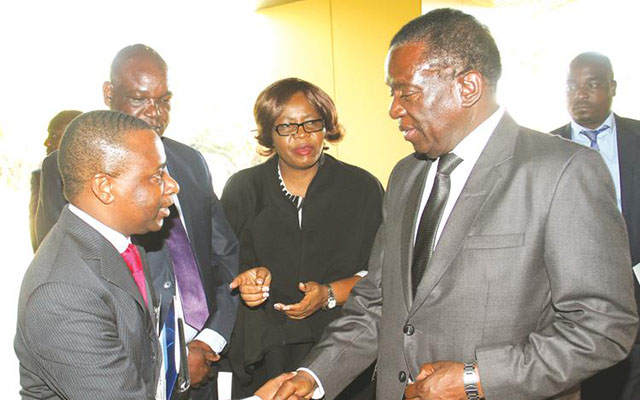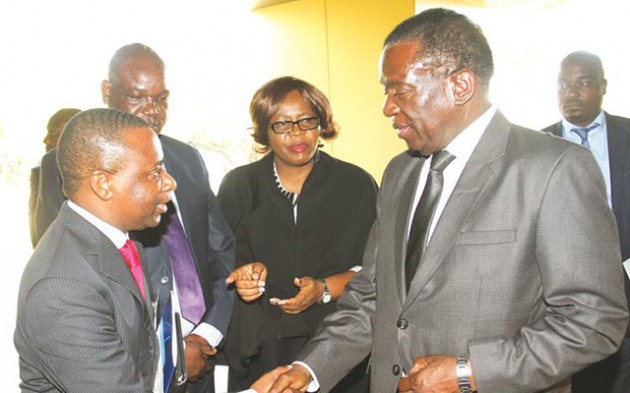Seven Bills to promote ease of doing business


Vice President Emmerson Mnangagwa talks to Public Accountants and Auditors board chairperson Mr Brian Njikizana (left), while Minister of State in his office Clifford Sibanda and Minister of State for Harare Metropolitan Provincial Affairs Miriam Chikukwa look on during a conference in Harare yesterday. — (Picture by John Manzongo)
Tendai Mugabe Senior Reporter—
Government has made strides towards creating a conducive business environment to transform the economy and attract Foreign Direct Investment after tabling seven Bills to do with the ease of doing business during the first quarter of this year. This is in keeping with Government’s pronouncement last year that 13 laws will be promulgated in the first quarter of the year to create a conducive investment climate by addressing concerns previously raised by foreign investors. Some of the Bills include the National Competitiveness Commission Bill, the State Procurement Bill, Judiciary Laws Amendment Bill and the Shop Licences Amendment Bill.
Addressing delegates at the fourth Zimbabwe Accountants Conference in Harare yesterday, Vice President Emmerson Mnangagwa said Government was committed to working with the private sector in formulating policies that enhance the country’s competitiveness.
He said Government had no monopoly and was open to new ideas that could spur economic development.
“I am sure that with right polices in place, for example, a conducive business environment, a skilled financial services sector, an adequate enabling infrastructure and most importantly an aggressive private sector, nothing can stay in the way of attaining a prosperous economy,” said VP Mnangagwa.
“I am aware that Zimbabwe is listed very low in the quest of ease of doing business. On our own as Government, we have now several, seven to 10 pieces of legislation, that are going through Parliament in order to enhance the ease of doing business.
“But most importantly, I think professionals like you (the accountants) should come forward to assist us with knowledge as to what you see as constraints in the implementation of formation of doing business in the country so that we legislate accordingly.
“If you think that we have the capacity and the knowhow to bringing about the ease of doing business without yourselves you are mistaken. The desired socio-economic development is the collective responsibility of all Zimbabweans, inclusive of those at home and in the Diaspora.”
Zimbabwe is “endowed with various trade and investment opportunities which cut across value addition, technology transfers, productivity, capacity enhancement and industrialisation, especially in the agro-sector,’’ VP Mnangagwa said.
“Zimbabwe, like most developing economies, needs an enhanced investment climate, inclusive of opportunities for business to acccess finance, improved private and public sector governance, as well as a workforce with skills and competencies to work in the modern market place and commitment to tackling endemic corruption,” he said.
“As you are all aware, Zim-Asset was formulated in pursuit of a new trajectory of accelerated economic growth and wealth creation. It was crafted to achieve sustainable development and social equity anchored on indigenisation, empowerment and employment creation.”
VP Mnangagwa said Government, through Command Agriculture, was expecting an estimated maize output in excess of two million tonnes this season, which was expected to spur industrial growth.
“Worldwide, there is growth in industries using starch as a raw material from maize and other agricultural produce, as it is vital for industries to foster value-addition and beneficiation of produce from the agricultural sector,” he said.
VP Mnangagwa said the thrust of the indigenisation law was to ensure that indigenous Zimbabweans have direct control of the economy.
“When we as Government introduced the concept of indigenisation, may people in our society thought that we are taking the country back, but all the developed countries in the world are indigenised,” he said.
“They call their economies theirs. That is the indigenisation we are talking about. Those of you who have misconception must understand that we want to be ourselves, manage our economy ourselves, be the major players in our economy ourselves.
“Empowerment means that you must have access to the tools, make yourself able to run your own economy. Employment creation, this would be achieved through judicious exploitation of the country’s abundant human and natural resources.”
VP Mnangagwa said Zimbabwe is endowed with numerous trade opportunities cutting across all sectors.
In light of this, VP Mnangagwa said, the accountancy profession was strategically positioned to make remarkable contribution to the growth of the economy.
“Accountancy professionals need to assist business with developing sound corporate strategies, providing sound financial advice and helping business to reduce costs, improve their top line in mitigating risks,” he said.
“As chief financial officers, you have oversight on all matters relating to the company’s financial health. This includes creating and driving the strategic direction of the business to analysing, creating and communicating financial information.”
The conference was also attended by Minister of State for Harare Metropolitan province Miriam Chikukwa, Minister of State in the Vice President’s Office Clifford Sibanda, Comptroller and Auditor General Mrs Mildred Chiri and Public Accountants and Auditors Board chairperson Mr Brain Njikizana.









Comments